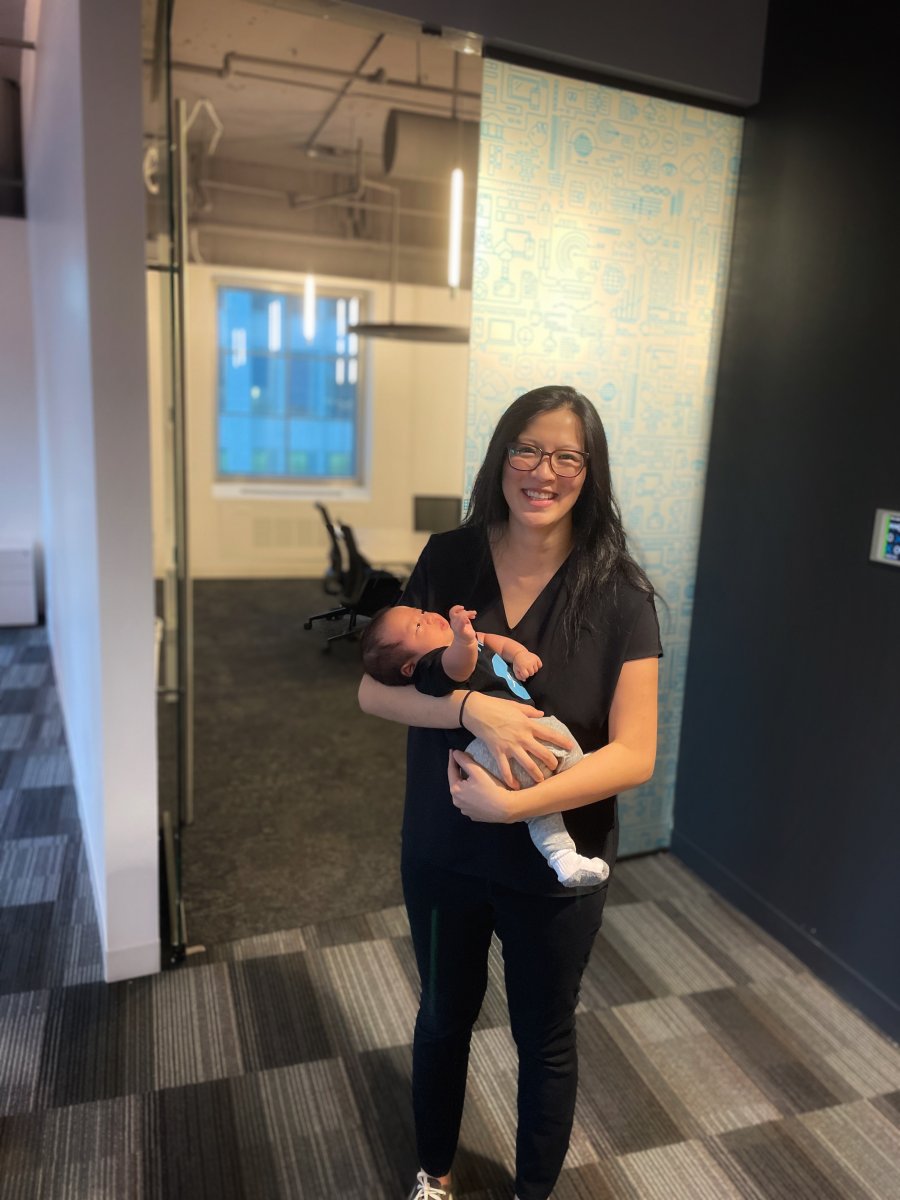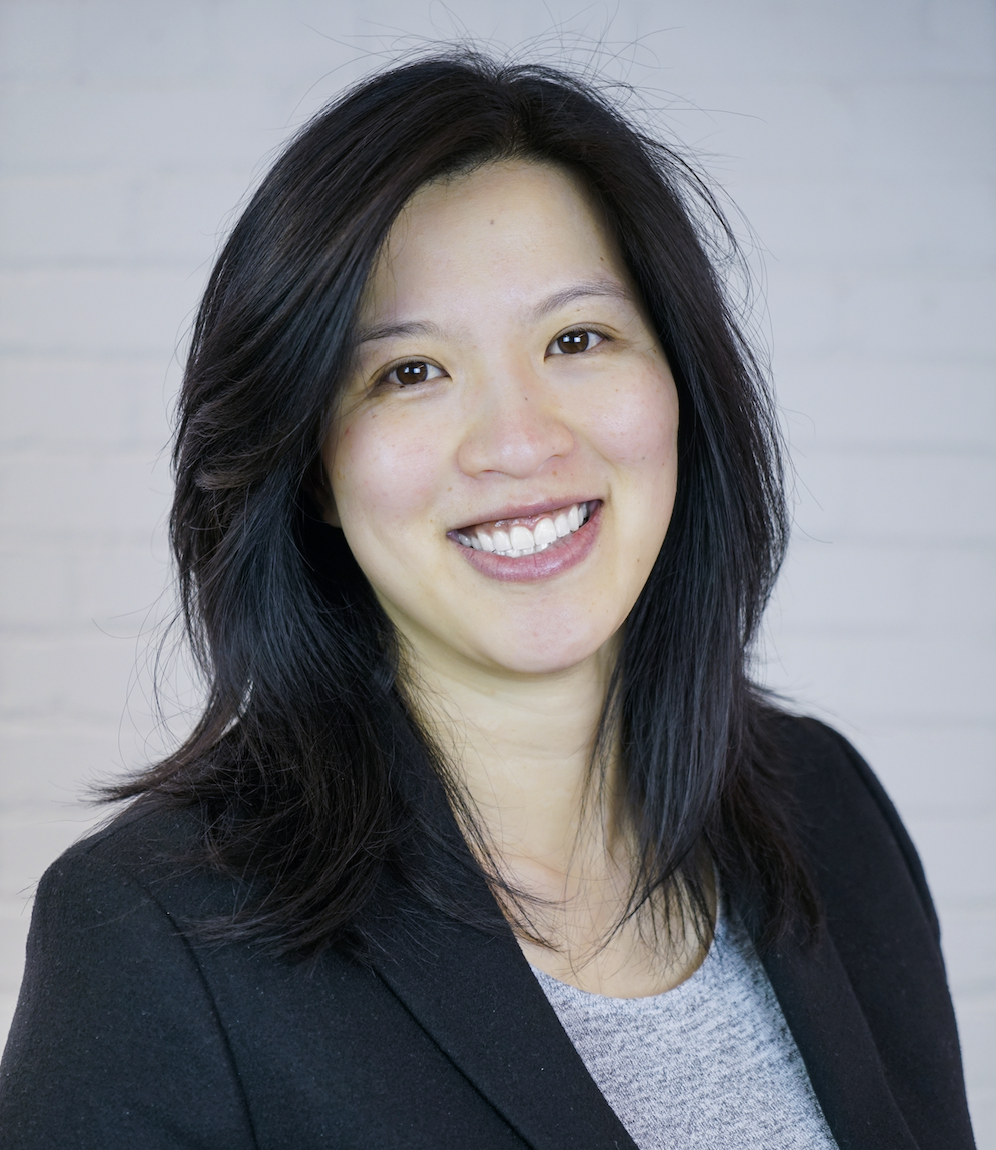[vc_row][vc_column][vc_custom_heading text=”“Chase the growth, not the titles or the compensation.”” font_container=”tag:h4|text_align:left”][vc_column_text]For many people, it’s easy to fall into the trap of envisioning a career that follows a standard trajectory. Sometimes, climbing up a straight ladder can be a very successful route. However, the best personal growth doesn’t necessarily come from a straight and narrow path. No one knows this better than Faye Pang, who was recently announced as Canada Country Manager for software company, Xero.
Having immigrated to Canada from China at a young age, Pang saw how hard her parents worked to make a life for themselves in a new country. Their determination was instilled in Pang, whose work ethic has seen her help build some of the world’s most recognizable brands: Cadbury, McDonald’s, Uber, and now Xero.
Pang, who began her career in marketing, never could have imagined her shift into the tech sphere. Notably, helping launch food-delivery giant UberEats in 2015. However, by refusing to box herself into a role, and continuously seeking to learn more, she successfully navigated the new world.
“I’ve made a number of pivots in my career, both intercompany and intracompany, but always in the vein of trying to get that additional personal growth or that additional skill that I don’t feel that I have,” said Pang.


Now, she’s taking her talents to help build Xero’s presence in Canada—though it took a bit of convincing.
The cloud-based accounting software aims to support small businesses by streamlining and simplifying the process and relationships with accountants and bookkeepers. When Xero was looking for someone to expand the business in Canada, Pang knew she was the right person for the job. Only, she was let go at the final stages of the interview process.
Pang embodies the resilience and grit that’s needed to be successful in a COVID-19 world (and a post-COVID-19 world) and she shares with us how she turned her rejection into a job offer. For this week’s Women Who Lead spotlight, Bay Street Bull spoke with Faye Pang, Canada Country Manager of Xero, about being a woman in tech, personal growth, and the importance of female representation in leadership roles.[/vc_column_text][vc_text_separator title=”Q&A” color=”custom” style=”double” border_width=”2″ accent_color=”#26d0f2″][vc_column_text]
What was your work experience before the role you’ve just taken on a Xero?
I was part of the original team that launched the UberEats app in Toronto back in December of 2015. At the time, Toronto was the very first city in the world to get the app, which was very exciting—we were sort of the pilot city for it. So, from that point, I took on progressive roles within the organization in Canada, starting on the marketing side. In those early days, it was just a handful of us, so it was all hands on deck and I took on overseeing the restaurant operations team and grew that from a handful of folks to about 45 people. I was the GM for the UberEats business for the better part of a year and then just before I left Uber, I was asked to help run and launch our newest line of business, which was Uber Freight. I never thought I would get into trucking, but it makes a lot of sense when you learn about the industry.
I was running that [Uber Freight] just before making the move to Xero, so that’s the bulk of my tech experience. Before joining Uber, my background was in consumer packaged goods (CPG) and fast-moving consumer goods. I was at a company called Mark Anthony, with brands like Mike’s Hard Lemonade and Palm Bay, and now White Claw. It’s a really innovative family-run organization here in Canada and I was there for four years doing brand and portfolio management. Prior to that, I was in fast-moving consumer goods, working for McDonald’s during the 2010 Winter Olympics, and I started my career at Cadbury marketing gum and chocolate.
You have such a wide range of experience in your portfolio leading towards this tech sphere, what kind of lessons have you learned along each step of the way that you incorporate into your career now?
If you look at my career progression—which, by the way, was not planned—it revolved around chasing personal growth and interesting opportunities. I think if you look at my career progression and sort of lessons along the way, I think every job that I’ve held, and every role within every company has served a purpose.
I think starting in marketing was very natural to me because I’m super interested in human psychology: why we buy, how people behave, and how organizations and companies can create products that solve needs. So, I learned a lot and took away a lot from that, but you also learn what you don’t like [over time]. I think the need for speed was something that I was consistently feeling early in my career, and it ultimately led me to tech because you just see how much faster technology companies can move and need to move to be successful.
That [speed] was something that I identified in myself as something that I needed to be excited to get out of bed every morning. So when the opportunity at Uber came up, I absolutely jumped on it, because the rocket ship that it was at the time, and still is, was really exciting to me. Now, I feel the same way about Xero. The move to Xero is really exciting because I truly feel a strong values alignment. Early on in your career, you might not feel like you’ve got the experience and the ability to stand up and say, “Hey, I really want to work for a company that aligns with my values.” But certainly, over the last decade-plus, I’ve gotten there.
And speaking of that switch to Xero, I was told that you previously applied for the position but you didn’t get it. I think that’s something that happens to a lot of people, they feel like they’re a great fit for a role, but it doesn’t work out. What did you do between the rejection and getting the offer?
As it was for a position of seniority, it was a very long process. Let’s just say over a dozen interviews, and I was in the final group. All of the interviews had been great; I’d really felt a connection with the folks on the other side of the line. As I learned more about the company, the role, and the challenge ahead, I just became so convinced that I was the right person for this job. So imagine my dismay, when I was told, “We’re moving forward with other candidates into the very final round.”
I was absolutely gutted. I spent the weekend feeling very sorry for myself, rehashing every word that I said in interviews, and trying to think about how I could have done things a little bit differently. But ultimately, I was inspired by another woman: Barbara Corcoran from Shark Tank. She famously wrote a letter to Mark Burnett when he turned her down and said, “You know, you’re wrong. Here’s why.” I was not quite as feisty as her, but I wrote an email to Tony, who’s the hiring manager, and I said, “Listen, I’m a lifelong athlete, I don’t give up until the final whistle. And here’s why I think you might be making a mistake.” I laid out why I thought I should be put back into the process, and didn’t hear back for four days, which was extremely stressful. I was telling my husband, “Oh, my gosh, I shot myself in the foot, these guys were never going to talk to me again.” And to his credit, Tony wrote back four days later, and he said, “Hey, I’ve been thinking about your email all week, you’re right. We’re going to put you back in the process.” So, a huge credit to Tony for allowing me to change his mind.
The lesson that I’ve tried to share with folks in my network is, if you’ve got a deep conviction that that’s the right role for you, keep pushing. You never know if things change. Interview processes in general are very open to bias and quick decisions—that’s just how they’re designed and necessarily so. But, if you’re passionate about a role and an organization, don’t give up.
And during that interview process, I heard that you leaned into your own experience as an immigrant, not just your work history and what was on paper. Why do you think it’s important for people to talk about things that venture further than work experience when applying for jobs?
I think it’s everything. Who you are and how are you going to show up at work are not just the bullet points on your resume. It’s where you come from, how you were brought up, the experiences that you’ve had, the passion that drives you. I think I’ve been increasingly encouraged because more and more companies are now realizing and restructuring their interview process and the questions they ask to try to highlight and bring that to the forefront. It’s not just, “What projects have you led?” and “Can you can you tell us a bit more about the numbers?” because that doesn’t tell the whole story.
In my particular situation, it was important to play up why I was so excited about Xero and the mission that the organization has in empowering and helping small businesses. I grew up watching my parents struggle as new immigrants to Canada, launching their own business. My dad hand-delivered boxes of meat on the TTC. I saw that and I saw how hard that was, and so that’s driven how I think about where I can have an impact.
How do I want to spend my days at work? Supporting small businesses, improving their rate of success, using technology, and making it accessible to passionate business owners and entrepreneurs that might not have had access to that before. Those are things that got me going at Uber, with Uber Eats, and what food delivery can mean for a restaurant. Now it’s getting me excited about Xero and what the platform can do for SMBs. So, it is very hard for me to decouple my lived experience and how I am as a leader and a contributor in my work life because they’re inextricably linked.
With that experience of being an immigrant and seeing your parents work so hard to build their business up from the ground. What kind of effect do you think that’s hard on yourself for your work ethic and your work style?
Oh, it’s had a lot. I was born in China and I consider myself a Chinese-Canadian. When I think about watching my parent’s work ethic—working six, seven days a week for 22 years—it’s had a huge impact on me. I think, one, resolving to not want to do that myself. But, two, seeing that in a lot of cases, there’s no substitute for hard work. What I took away was, they were able to build something for themselves. In terms of how that shows up for me and my work, I’ve always been super keen to roll up my sleeves and dive in. There’s no substitute for doing that to get the lessons and to understand how we can innovate ourselves out of the position that we’re in.
The other one is my parents were some of the first in the family to immigrate to Canada, so I took away the importance of helping those coming up behind you. We came to Canada when I was just a toddler and in Chinese culture, supporting your family is a non-negotiable, right? Our home quickly became a landing zone for uncles, aunts, and cousins, that my parents sponsored to come and pursue a better life in Canada. I think about that a lot as it relates to who I am as a leader in the workplace: How can I make a small investment that has a big impact on someone’s life down the line? How can I use my position as a leader to model the behavior I want to see and try to normalize things like being a female GM or having kids at a tech company, and still coming back, getting promoted, and not feeling like you took a step back? I think as a leader in my position, coming from where I’ve come from, it’s a responsibility to make sure that I’m helping those that are coming up behind.


Were there any big challenges as you kind of made that switch from marketing into this tech sphere? As a female?
When entered the tech industry in 2015, I was coming from a background in CPG and marketing, and I was excited to join a much more fast-paced environment. At the time Uber Canada was only about 30 or so people, and the gender dynamics were pretty pronounced: the majority of the marketing team was female, the core operations team was predominantly male, all of the GMs across the country were were male as well. But you know, all that being said, I feel like I was one of the lucky ones. I never felt discriminated against for being a woman or ultimately for becoming a mom, or one of the rare parents in the office. The forces, as we talked about, were much more subtle, “If you don’t see it, can you be it?” Lack of female representation at the senior level and all the stories that I told myself were probably the hurdle that I had to personally overcome. I don’t have a juicy story about overt discrimination because I was lucky enough to not have felt that.
That being said, 2017 was a big year of reckoning for Uber. Reading about others’ uncomfortable experiences there forced me to do some deep reflecting on my own experience, and ultimately the type of environment I wanted to create in Canada, and on the teams that I could personally impact. So, I took that opportunity and chose to embrace being the first mom at Uber in Canada. I came back from parental leave to lead our Parents at Uber employee resource group globally, really helping to push and usher in Uber’s outstanding parental leave policies. So, I took that as an opportunity to try and make the difference where I could. And I’m really proud of that.
That’s awesome. And now, obviously, you have a new leadership position at Xero. Can you tell me a little bit more about what your role will consist of and how all these past experiences are going to come into play?
Yeah! I’m so excited about my new role at Xero. I’m the new country manager for Xero in Canada, so I’ll be responsible for the go-to-market strategy as we expand our presence and ultimately, aim to become the number one small business platform in the country. What I’m excited about is diving in and helping small businesses be more successful, giving them access to technology, data, and insights; an ecosystem of tools that they can use to be successful.
During this pandemic, the outsized impact that COVID-19 has had on small businesses breaks my heart. And so, when we think about what our team’s mission is, and what we’re going to be able to do in Canada, going forward, I’m just really excited for the impact that we can have on the small business community in the country.
And throughout your career, what is the best piece of advice you’ve received??
One of my very first managers at Uber gave me this piece of advice. I was feeling kind of down on myself, it would have been a really long day, and I felt that I was not making a ton of progress. He said to me, “Your job here is to innovate yourself out of your job.”
In a fast-paced environment, in a tech environment, you scale by doing the unscalable. You have to focus on how you can innovate. How can you innovate yourself out of the work that you’re doing today? I really push myself and my teams to think about that, how can we keep pushing forward? Keep doing that next thing?
Along those lines, if you were to give advice to another woman who’s kind of entering the tech sphere, or is experiencing hardship in the tech sphere, what would you tell them?
There are two thoughts I’d share. Anyone who’s, who’s worked with me, or who knows me, knows that I always say, chase the growth, not the titles or the compensation. I think the last few are truly lagging indicators of who you are as an individual and chasing them can land you in a spot where you might be making more but significantly less happy. I’ve made a number of pivots in my career, both intercompany and intracompany, but always in the vein of trying to get that additional personal growth or that additional skill that I don’t feel that I have.
And then the second one is kind of cliche, but networking has been really powerful for me. Of all the roles and positions that I’ve had in my career, I think I’ve only applied for one formally, through a portal: my very first job out of school. Everything else has been someone in my network tapping me saying, “Hey, I think you’d be great for this.” You still going through the interview process, but having folks that know who you are, know what your values are, and know the value that you can bring to an organization is almost having like having recruiters everywhere, right? I believe in and have felt the benefit of networking and having really strong connections and relationships and trying to maintain those. So, I encourage folks to do that as well.
Was there anything that we haven’t touched on that you’d like to speak about?
One thing we haven’t touched on is that I’ve got a five-week-old. One of the things that I think is really important as we think about female leadership—and not just diversity in the workplace, but inclusion in the workplace—is thinking about the systems and the processes that organizations have to promote and encourage female participation, particularly at the senior level. You’ve probably seen some of the stats around the exodus of women from the workplace through the pandemic and the outsized impact it’s had particularly on working moms. So, I’m really grateful that Xero has supported me—I’m on parental leave at Xero right now, having not yet worked a formal day in the office!
A policy like that, which is just really centered on promoting and encouraging the well being of parents at an organization, is, I think, so critical. You can recruit all of the females or the working moms that you want, but if you don’t have a system around supporting them, and ensuring that they’re successful and that they’re not feeling like they’re having to make trade-offs, they’re gonna they’re going to be flashes in the pan and then out. I’ve been encouraged to see a lot more organizations rethinking their parental leave policy and how they’re supporting caregivers in the workplace. And I’m encouraged to see even more of that in the coming year.
[/vc_column_text][vc_separator color=”custom” accent_color=”#26d0f2″][/vc_column][/vc_row]













